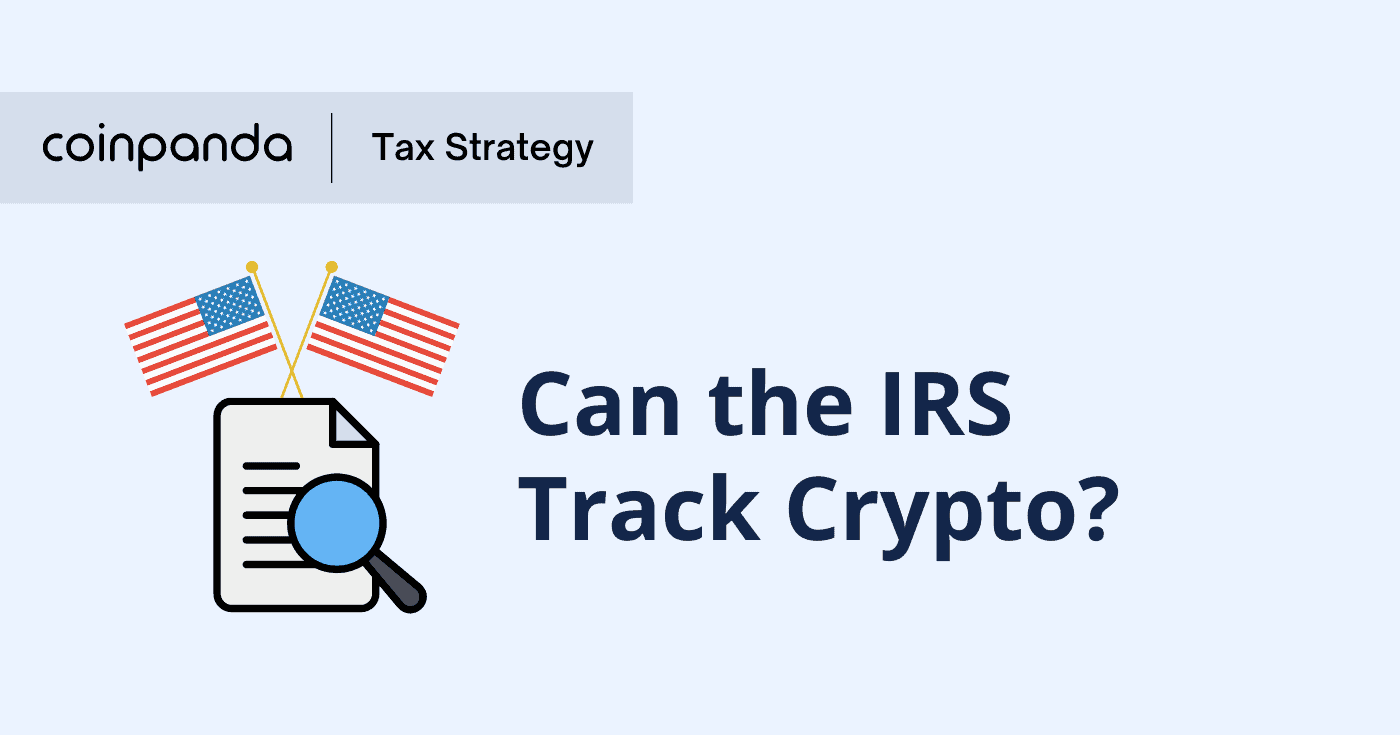One question on the minds of many cryptocurrency users in 2023 is if the IRS can track crypto. While a common belief is that cryptocurrency transactions are completely anonymous, this is quite far from the truth.
In this guide, we will explore how the IRS can track crypto, which information the IRS may collect about your crypto activity, and which exchanges report customer data to the IRS.
Key takeaways
- The IRS can track cryptocurrency transactions through self-reporting on tax forms, blockchain analysis tools like Chainalysis, and KYC data from centralized exchanges.
- While most transactions can be tracked, certain privacy-focused blockchains and some exchanges make tracking difficult.
- Attempting to hide cryptocurrency from the IRS is illegal and can result in serious penalties, including fines and imprisonment.
- Exchanges such as Coinbase, Binance.US, and Crypto.com report customer data to the IRS, while many international exchanges like KuCoin, OKX, and Bitget might not.
Can the IRS track crypto?
Yes, the IRS can track cryptocurrency transactions both on various blockchains and on centralized exchange platforms. Native blockchain transactions can be tracked by blockchain analysis, while several centralized exchanges based in the U.S. must comply with IRS regulations and report customer information such as KYC data and transaction records.
However, this doesn’t mean that all transactions can be tracked. Several privacy-focused blockchains make it almost impossible to track transactions and get information about who controls which addresses, and many centralized exchanges have not reported customer information to the IRS yet.
How can the IRS track crypto?
The IRS leverages mainly three different methods for tracking cryptocurrency:
- Self-reporting on Form 1040
- Blockchain analysis tools (e.g., Chainalysis)
- KYC and customer data from centralized exchanges
First and foremost, they rely on self-reporting from U.S. taxpayers. The IRS has included a question on Form 1040, asking if the taxpayer received, sold, sent, exchanged, or otherwise acquired any cryptocurrency. This direct approach should encourage taxpayers to report their crypto transactions honestly.
Besides self-reporting, the IRS has a few tools in its toolbelt for tracking crypto, with one being advanced blockchain analysis tools to trace cryptocurrency transactions, such as those provided by Chainalysis and other similar firms. These tools enable the IRS to link blockchain transactions with identifiable individuals or entities.
Also, as part of IRS regulation, cryptocurrency exchanges operating in the U.S. must provide the IRS with information about customers who carry out high-volume trades. This means that even though transactions may be pseudonymous on the blockchain, they can often be traced back to the individuals involved, especially when using regulated and centralized platforms or services.
Can the IRS see my crypto transactions?
Yes, the IRS can potentially see your crypto transactions using advanced software tools for analyzing the blockchain, where all crypto transactions are recorded. By utilizing blockchain analytics, the IRS can trace the transaction history of a particular crypto wallet and in many cases link that wallet to the identity of a person.
The IRS can also gain access to information about your crypto transactions through regulated cryptocurrency exchanges, which are required to submit certain information about their users to the IRS, particularly regarding larger transactions.
Will the IRS know if I don’t report my crypto?
Although not always, there is a significant risk that the IRS will discover if you don’t report your cryptocurrency transactions. The IRS is currently using sophisticated tools to detect unreported cryptocurrency, and it should be expected that the agency will continue doing this.
Since the IRS uses advanced blockchain analysis tools that can trace the activity of a specific wallet on the blockchain, the agency may link a wallet to your identity and discover unreported transactions. Additionally, the IRS has previously sought court orders to obtain user data from cryptocurrency exchanges. Failure to report cryptocurrency on your taxes violates U.S. law and could result in penalties, interest, or criminal prosecution. Therefore, it’s highly recommended to report all cryptocurrency transactions on your tax return.
How do I hide crypto from the IRS?
Attempting to hide cryptocurrency from the IRS is illegal and can lead to serious penalties, including fines and imprisonment. The IRS has taken significant measures to track cryptocurrency transactions in recent years, making it very difficult to hide your crypto assets completely from the IRS.
All taxpayers should comply with the laws in their respective jurisdictions, which in the United States includes accurately reporting all cryptocurrency holdings and transactions. If you are unsure how to report your cryptocurrency, check out our Crypto Tax Guide for the USA.
Can I be linked to a wallet address?
Yes, there are several ways that your identity can be linked to a cryptocurrency wallet address. This includes using credit or debit cards to purchase crypto within non-custodial wallets and transfers between your wallets and exchange accounts.
Many non-custodial wallets, such as MetaMask and Trust Wallet, let you buy crypto directly using credit or debit cards. While this is a quick and easy way to buy or sell crypto, it may also connect your identity with a certain wallet address. Since banks are also required to share bank account details with the IRS, the tax agency now has a way to identify U.S. taxpayers that have transacted with crypto using many of the most popular wallets today.
Another way the IRS can link your identity to a wallet address is by analyzing transactions reported by centralized exchanges. Let’s say that you transfer some Bitcoin from your Coinbase account to your MetaMask wallet. Based on the data reported by Coinbase, the IRS can now link your identity to the MetaMask wallet address you transferred the coins to.
At last, the IRS uses advanced blockchain analysis tools and techniques to identify patterns and potentially link wallet addresses to individuals.
Can the IRS track NFTs?
Yes, the IRS can potentially track transactions involving Non-Fungible Tokens (NFTs) by using various methods like they can track other cryptocurrency transactions. Since NFT transactions occur on the blockchain, they leave a publicly visible trail that can be used to link an NFT owner with an identity.
Is Bitcoin traceable by the IRS?
Yes, Bitcoin transactions can potentially be traced by the IRS. Although Bitcoin transactions are pseudonymous, it’s crucial to understand that they are not completely anonymous. Since all Bitcoin transactions are recorded on a public blockchain, the IRS has the ability to use advanced software tools to analyze these transactions and identify the person that controls an address.
Moreover, most people use cryptocurrency exchanges as an entry and exit point for Bitcoin. In the United States, these platforms must implement Know Your Customer (KYC) and Anti-Money Laundering (AML) procedures, which involve collecting identifiable user information. If you’ve bought or sold Bitcoin through a regulated exchange, this information is potentially accessible by the IRS.
Does Coinbase report to the IRS?
Yes, Coinbase, like other regulated cryptocurrency exchanges, does report certain information to the IRS. As a financial institution, Coinbase must follow certain reporting practices under U.S. law, which include filing a 1099-MISC form for U.S. customers who have received cash, cryptocurrency, or other types of income above a specific threshold in a given tax year.
Additionally, under the 6050I section of the U.S. Internal Revenue Code, cryptocurrency exchanges such as Coinbase must report any transactions involving physical currency (i.e., cash) of over $10,000 to the IRS.
In 2016, the IRS also won a John Doe summons on Coinbase, forcing the exchange to report customer data to the IRS that can be used to identify U.S. taxpayers together with relevant documentation relating to their crypto activity.
Starting in 2023, the reporting rules for exchanges have been expanded by the Infrastructure Investment and Jobs Act, and now Coinbase and other exchanges will have to report more information about their customers’ cryptocurrency transactions to the IRS, including profits and losses.
Does Binance report to the IRS?
Binance, like other cryptocurrency exchanges, does have reporting obligations. However, the extent to which Binance shares information with the IRS may depend on your location and the specific Binance platform you are using.
Binance.US is regulated by U.S. law and follows strict KYC and AML procedures. This means Binance.US collects user information and must report certain transaction details to the IRS, particularly for high-volume traders.
On the other hand, the global Binance platform, often just referred to as Binance, has a more complicated relationship with U.S. regulators. Since U.S. citizens are technically not allowed to use the international Binance platform, they are also not able to complete KYC and therefore cannot fully use the Binance platform either.
Does KuCoin report to the IRS?
KuCoin is not based in the United States and does not have the same reporting requirements to the IRS as U.S.-based exchanges like Coinbase or Binance.US. Unlike these exchanges, KuCoin does not directly send information to the IRS.
Remember that if you are using KuCoin without completing KYC, several restrictions apply to which features you can use on the platform. This might change in the future, and it’s a good chance that also KuCoin will require all customers to complete KYC to use the platform for trading later on.
Does Crypto.com report to the IRS?
If you are a U.S. resident using Crypto.com, the exchange may report your transactions to the IRS, especially if you’re conducting high-volume trades.
Crypto.com must follow the same IRS requirements as Coinbase and Binance.US regarding reporting customer data. This would involve providing information to the IRS about users with a large number of transactions or if the transactions meet a certain dollar amount in a calendar year.
Which crypto exchanges do not report to the IRS?
Many international cryptocurrency exchanges that do not have a physical presence in the U.S. or do not specifically cater to U.S. users may not require users to complete KYC or report customer data to the IRS. These exchanges might include platforms like:
- KuCoin
- OKX
- Bitget
- MEXC
- Gate.io
Keep in mind that exchanges that are not enforcing KYC data might put several restrictions on their non-verified users. For example, OKX has a daily withdrawal limit and does not allow buying crypto with fiat without completing KYC verification.
Another thing to consider is that many of these exchanges are not legally allowed to serve U.S. customers and will not allow anyone to access their platform using an IP address from the U.S. or other prohibited countries.
Although we do not encourage this, many people are using services such as VPNs to change the location of their IP address to be able to use these exchanges. Doing this comes with significant risk since exchanges may freeze your funds or even completely lock your account if they discover you violated their terms of service.



